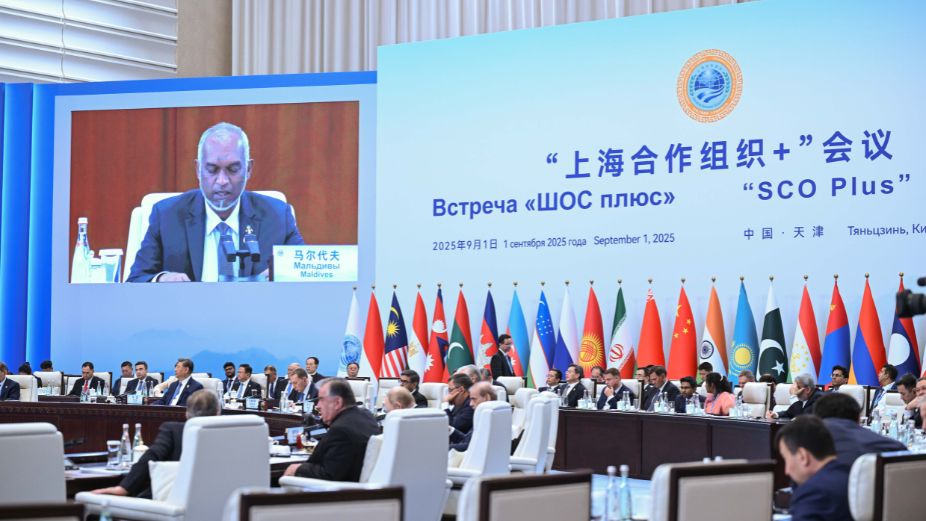
As the Shanghai Cooperation Organization (SCO) Summit concluded in Tianjin, China — the largest in the bloc’s history — the Maldives found itself at the same table as global giants such as China, India, and Russia.
Why the SCO Matters
The SCO traces its roots to the 1996 “Shanghai Five” (China, Russia, Kazakhstan, Kyrgyzstan, and Tajikistan). Formally established in 2001, it has since grown into one of the world’s largest regional blocs, bringing together powers like India, Pakistan, and Iran.
Today, the SCO has 10 member states — China, Kazakhstan, Kyrgyzstan, Russia, Tajikistan, Uzbekistan, India, Pakistan, Iran, and Belarus — representing 43% of the global population and 23% of global GDP. Beyond that, it has 14 dialogue partners, including Sri Lanka, Turkey, the UAE, and the Maldives.
This year’s summit brought together a powerful lineup of leaders, from Vladimir Putin and Narendra Modi to Recep Tayyip Erdoğan and Mohamed Muizzu. International media framed the gathering as part of a broader geopolitical contest, with China positioning itself as a counterweight to the United States.
Balancing India and China
For President Dr. Mohamed Muizzu, who came to power on a pro-China platform, this summit was more than a diplomatic exercise. It was also an opportunity to show that the Maldives is capable of balancing relationships — not just tilting toward one side.
India has been a longstanding partner for the Maldives, especially in infrastructure, health, and security cooperation. But recent years have seen sharp swings: the previous Yameen administration leaned heavily toward China, while Solih tilted back toward India. Muizzu, critics argue, entered office looking too China-friendly. The SCO Summit provided a rare stage where both India and China were present, giving the Maldives a chance to demonstrate that its foreign policy need not be a pendulum swing between the two, but instead a balancing act.
Tourism and Fisheries: A Narrow Base
Tourism remains the Maldives’ primary economic lifeline, contributing nearly a third of GDP, while fisheries — though smaller — account for the main export. Successive governments have pledged to broaden this base, but results have been limited. Could closer ties with China help change that?
Chinese Ambassador Kong Xianhua recently told state-owned PSM News that Maldivian fish and seafood products are set to make a stronger entry into the Chinese market. “Business relationships are being established between the Maldivian and Chinese people. We will see a significant impact in the near future,” he said.
The Free Trade Agreement (FTA) with China, which came into effect earlier this year, aims to boost such opportunities by cutting tariffs on Maldivian exports. Ambassador Kong projects that the impacts will become clearer in the next one to two years.
Already, a Chinese firm produced the first canned batch of Maldivian tuna in July, under a joint venture between Weihai QZ Blusea Foods and Jingweidao. Critics argued that outsourcing processing to China undercuts domestic value addition, but it does signal a concrete step toward introducing Maldivian tuna into the Chinese market — tariff-free.
Yet some Maldivian economists remain cautious about the FTA. They note that while it could increase export opportunities, China’s market standards are strict, and Maldives’ limited production capacity may prevent it from taking full advantage. Without major investment in local processing and branding, the benefits could flow unevenly, favouring foreign partners over Maldivian workers.
Another key element of the FTA is the move to conduct bilateral trade in local currencies (the Maldivian Rufiyaa and Chinese Yuan). For a country facing persistent dollar shortages, this could ease pressure on reserves and reduce dependence on the US dollar. Whether this can be scaled up in practice, however, remains an open question.
Building Bridges to Emerging Markets
Tourist arrival trends in the Maldives have shifted over the years, with India, China, the UK, and Russia alternately dominating arrivals. But for long-term stability, the Maldives must look beyond traditional partners. Expanding tourism and trade ties with emerging markets is becoming essential — not just for economic growth, but for resilience in a turbulent global economy.
China’s Global Governance Pitch
At the SCO Plus meeting, Chinese President Xi Jinping unveiled what he called the Global Governance Initiative, a five-point vision for how countries — big and small — should work together.
- Sovereign equality: All nations, regardless of size or wealth, should be equal participants and beneficiaries in global governance.
- Rule of law: International law should apply to all countries equally, without double standards.
- Multilateralism: Nations should resolve global challenges through consultation and cooperation, not unilateral action.
- People-centered development: Governance systems should prioritise the well-being of citizens and narrow the global North-South gap.
- Real action: Initiatives should produce visible, practical outcomes rather than remain political statements.
For the Maldives, Xi’s emphasis on sovereign equality resonates with its long-standing priorities. Historically, the Maldives has shown it can punch above its weight: spearheading the Climate Vulnerable Forum (CVF), playing a decisive role at COP15, and winning the UN General Assembly presidency with former Foreign Minister Abdulla Shahid. Among Small Island Developing States (SIDS), it has often been the loudest voice advocating multilateralism and climate action.
However, in recent climate negotiations, the Maldives has occasionally been left on the sidelines, largely due to weaker personal relationships with key decision-makers. Platforms like the SCO present an opportunity not only to reassert its voice, but also to build new networks that could strengthen its influence in global forums — balancing the country’s historic credibility with practical, contemporary diplomacy.












